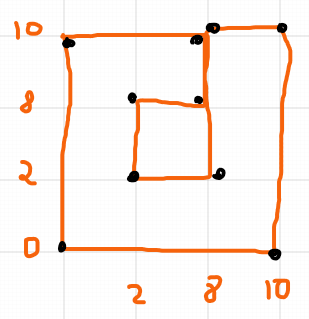ps.get(polygons); function applies a union operation to the polygons. This is by definition. If you add overlapping polygons and call get function you will get merged results, it won't match your original input.
Open todeschini-felipe opened 4 years ago
ps.get(polygons); function applies a union operation to the polygons. This is by definition. If you add overlapping polygons and call get function you will get merged results, it won't match your original input.
I want to represent a donut shape with
boost::polygon, such as the figure below, with the following points:Once I include the polygon into a polygon set data, however, it creates an additional unwanted point
(8,8)from(8,10)->(8,2). Evenboost::polygon::simplifyleaves this point. Is that the expected behavior?